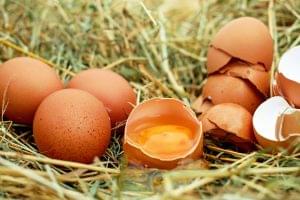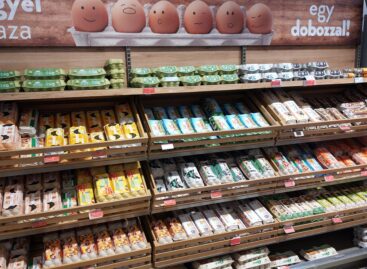Egg prices continue to rise: the elimination of cage farming makes the market more expensive
Egg prices in Hungary crossed the psychological threshold of one hundred forints by the end of January, and fewer and fewer places can get the product cheaper than this. Although a temporary price drop is expected after Easter, in the long term, the reduction of cage farming may result in further price increases – writes mfor.hu.
Development of egg prices in domestic stores
 At the end of January, fresh eggs of size S were available in Auchan for 70 forints per piece, while the premium category Szijártó Jumbo (L-XL) egg reached 110 forints. In smaller stores and markets, most egg prices have already exceeded one hundred forints, and special egg varieties are available even more expensively. For example, Tesco offered ten “A” class extra yellow XL eggs for 1,179 forints, or 118 forints per piece.
At the end of January, fresh eggs of size S were available in Auchan for 70 forints per piece, while the premium category Szijártó Jumbo (L-XL) egg reached 110 forints. In smaller stores and markets, most egg prices have already exceeded one hundred forints, and special egg varieties are available even more expensively. For example, Tesco offered ten “A” class extra yellow XL eggs for 1,179 forints, or 118 forints per piece.
Changes in producer prices
The autumn of 2023 brought some relief for egg producers, as purchase prices rose again, exceeding 61 forints in mid-November. The Hungarian Association of Hybrid Egg Breeders and Egg Producers had previously warned that a price increase would be inevitable due to low producer prices. Price caps and price freeze measures had significantly depressed purchase prices by August 2024, but with their abolition, they started to increase again from October last year.
Market turbulence and the threat of avian influenza
According to Dr. Tamás Kertész, CEO of Farm Tojás Kft., the January decline occurred despite the fact that demand remained consistently high. Due to unjustified price cuts by some producers, buyers were “given a bloodbath”, but the expert expects the price to stabilize again from February. Another price increase can be expected before Easter, followed by a slight decrease after the holiday. The further development of purchase prices largely depends on the extent to which avian influenza spreads during the spring bird migration, which poses a serious threat to egg farms.
The elimination of cage farming and its impact
Another important factor in the increase in egg prices is that cage farming is increasingly being pushed into the background in the EU and many Western countries. Large supermarket chains, including stores in Slovakia and Germany, are increasingly buying eggs from cage farming. In Slovakia, for example, there are fears that cage eggs may be completely removed from the market within three months.
Related news
The presence of bird flu has also been confirmed in Bács-Kiskun County
🎧 Hallgasd a cikket: Lejátszás Szünet Folytatás Leállítás Nyelv: Auto…
Read more >Related news
Sephora is coming to Belgium this year
🎧 Hallgasd a cikket: Lejátszás Szünet Folytatás Leállítás Nyelv: Auto…
Read more >MOHU: 5,200 return points are in operation, but 47 larger settlements still do not have RE points – public “enema” machines may be introduced
🎧 Hallgasd a cikket: Lejátszás Szünet Folytatás Leállítás Nyelv: Auto…
Read more >







